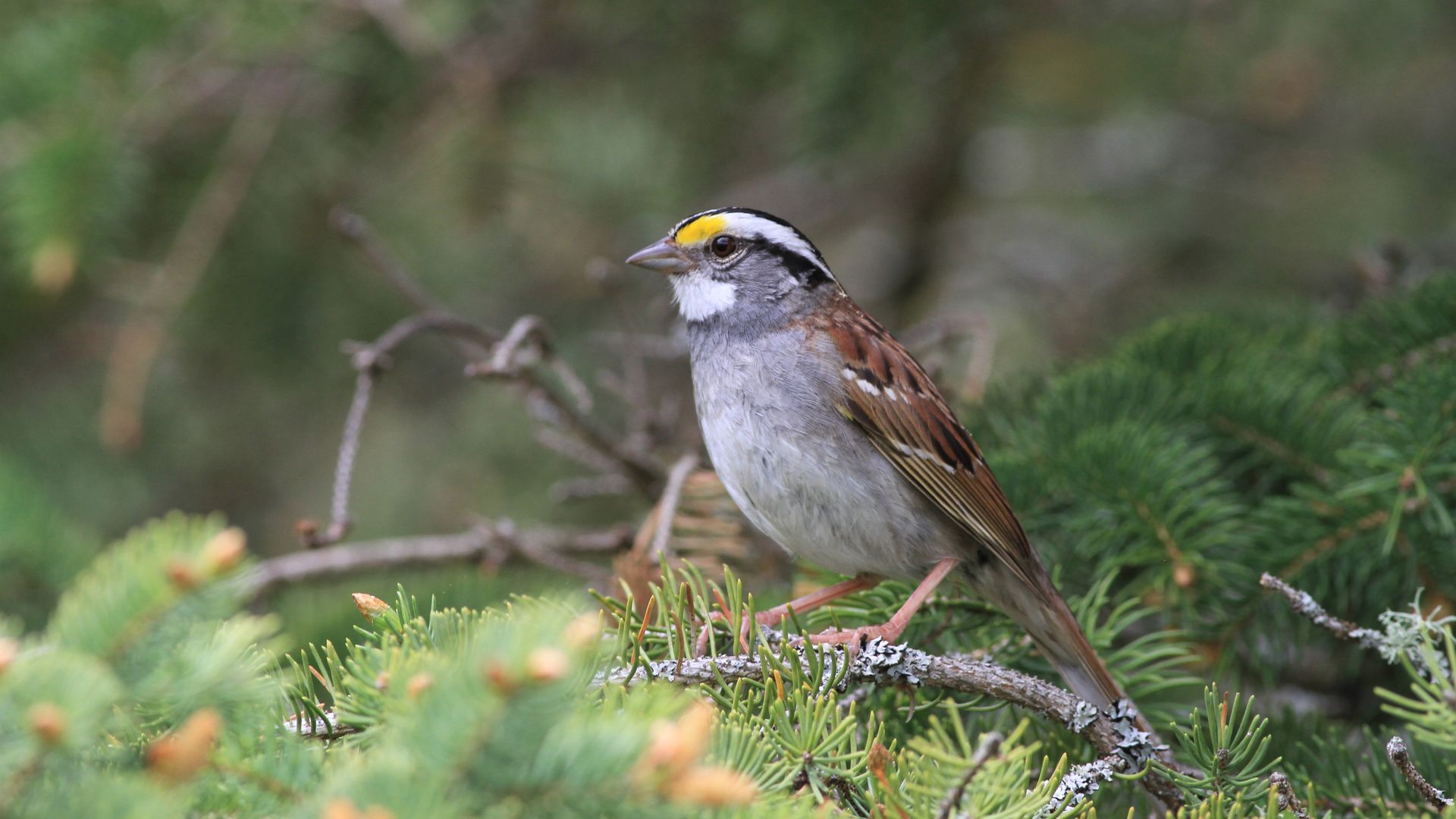OUR INDIGENOUS SONG BIRD
Issued on: 02/07/2020

The white-throated sparrow of North America, whose singing preferences are the subject of a new study Ken A. OTTER AFP
Washington (AFP)
Members of a Canadian sparrow species famous for their jaunty signature song are changing their tune, a curious example of a "viral phenomenon" in the animal kingdom, a study showed Thursday.
Bird enthusiasts first recorded the white-throated sparrow's original song, with its distinctive triplet hook, in the 1950s.
Canadians even invented lyrics to accompany the ditty: "Oh my sweet, Ca-na-da, Ca-na-da, Ca-na-da."
But starting from the late 20th century, biologists began noticing that members of the species in western Canada were innovating.
Instead of a triplet, the new song ended in a doublet and a new syncopation pattern. The new ending sounded like "Ca-na, Ca-na, Ca-na."
Over the course of the next two decades, this new cadence became a big hit, moving eastward and conquering Alberta, then Ontario. It began entering Quebec last year.
It's now the dominant version across more than 2,000 miles (3,000 kilometers) of territory, in an extremely rare example of the total replacement of historic bird dialect by another.
Scientist Ken Otter at the University of Northern British Columbia, and his colleague Scott Ramsay from Wilfrid Laurier University, described the dizzying pace of this transformation in the journal Current Biology.
"What we're seeing is like somebody moving from Quebec to Paris, and all the people around them saying, 'Wow, that's a cool accent' and start adopting a Quebec accent," Otter told AFP.
Their work was based on 1,785 recordings between 2000 and 2019, the majority made by them but with contributions from citizen-scientists, who posted the files on specialist sites like xeno-canto.org.
In the western province of Alberta, about half of the recorded songs ended with the triplet in 2004; ten years later, all the males had adopted the doublet.
In 2015, half of western Canada had converted to the doublet version, and by last year, the new song had been well established on the western tip of eastern Quebec province.At this rate, the historic triplet version may soon exist only in tape recordings.
- Bird influencers -
The males of the species sing to mark their territory, and their songs all share a common structure. Usually, if a variation appears, it remains regional and doesn't make headway in neighboring territories.
The study represents the first time scientists have been able to show this kind spread at huge geographic scale, said Otter.
So how did it happen?
Probably in the same way that children return from summer camp humming new tunes: songbirds from different parts of Canada winter in the same parts of the United States, then return to their own homes in spring.
The researchers verified this theory by tagging a few of the birds.
So it was that in the plains of Texas and Kansas, the new song's first adopters from western Canada -- avian influencers, if you will -- popularized the trend among their eastern brethren.
Previous work has shown that young birds can pick up a foreign song after listening to a recording.
But to truly understand why the males were willing to abandon the old song that had once served them well, the scientists have to rely on theories.
Otter believes it may be because females were more attracted to the new song, so young males rushed to adopt it.
"There seems to be some advantage to adding novel elements into your song that make the song, not necessarily more attractive, but increases people's attention to it," said Otter.
Going back to the human example, it would be akin to "if all the French women in Paris thought that a Quebec accent sounded much more interesting than a Parisian accent, and so everybody starts adopting a Quebec accent."
The hypothesis remains unverified.
Most bird species are slow to change their tune, preferring to stick with tried-and-true songs to defend territories and attract females. Now, with the help of citizen scientists, researchers have tracked how one rare sparrow song went "viral" across Canada, traveling over 3,000 kilometers between 2000 and 2019 and wiping out a historic song ending in the process. The study, publishing July 2 in the journal Current Biology, reports that white-throated sparrows from British Columbia to central Ontario have ditched their traditional three-note-ending song in favor of a unique two-note-ending variant--although researchers still don't know what made the new song so compelling.
"As far as we know, it's unprecedented," says senior author Ken Otter, a biology professor at the University of Northern British Columbia. "We don't know of any other study that has ever seen this sort of spread through cultural evolution of a song type." Although it's well known that some bird species change their songs over time, these cultural evolutions tend to stay in local populations, becoming regional dialects rather than the norm for the species. This is how the two-note ending got its start.
In the 1960s, white-throated sparrows across the country whistled a song that ended in a repeated three-note triplet, but by the time Otter moved to western Canada in the late 1990s and began listening to the local bird songs, the new two-note ending had already invaded local sparrow populations. "When I first moved to Prince George in British Columbia, they were singing something atypical from what was the classic white-throated sparrow song across all of eastern Canada," he says. Over the course of 40 years, songs ending in two notes, or doublet-ending songs, had become universal west of the Rocky Mountains.
Otter and his team used the large network of citizen scientist birders across North America who had uploaded recordings of white-throated sparrow songs to online databases to track the new doublet-ending song. They found that the song was not only more popular west of the Rocky Mountains, but was also spreading rapidly across Canada beyond these western populations. "Originally, we measured the dialect boundaries in 2004 and it stopped about halfway through Alberta," he says. "By 2014, every bird we recorded in Alberta was singing this western dialect, and we started to see it appearing in populations as far away as Ontario, which is 3,000 kilometers from us."
The scientists predicted that the sparrows' overwintering grounds were playing a role in the rapid spread of the two-note ending. "We know that birds sing on the wintering grounds, so juvenile males may be able to pick up new song types if they overwinter with birds from other dialect areas. This would allow males to learn new song types in the winter and take them to new locations when they return to breeding grounds, helping explain how the song type could spread," Otter says.
So the researchers harnessed sparrows with geolocators--what Otter calls "tiny backpacks"--to see if western sparrows who knew the new song might share overwintering grounds with eastern populations that would later adopt it. They found that they did. And not only did it appear that this rare song was spreading across the continent from these overwintering grounds, but it was also completely replacing the historic triple-note ending that had persisted for so many decades--something almost unheard of in male songbirds.

Otter and his team found that the new song didn't give male birds a territorial advantage over male counterparts, but still want to study whether female birds have a preference between the two songs. "In many previous studies, the females tend to prefer whatever the local song type is," says Otter. "But in white-throated sparrows, we might find a situation in which the females actually like songs that aren't typical in their environment. If that's the case, there's a big advantage to any male who can sing a new song type."
Now, another new song has appeared in a western sparrow population whose early spread may mirror that of the doublet-note ending. Otter and his team are excited to continue their work and see how this song shifts in real time with more help from citizen scientists. "By having all these people contribute their private recordings that they just make when they go bird watching, it's giving us a much more complete picture of what's going on throughout the continent," he says. "It's allowing us to do research that was never possible before."
###
This work was supported by the Natural Sciences and Engineering Research Council of Canada, the University of Northern British Columbia, and Wilfrid Laurier University.
Current Biology (@CurrentBiology), published by Cell Press, is a bimonthly journal that features papers across all areas of biology.
Current Biology strives to foster communication across fields of biology, both by publishing important findings of general interest and through highly accessible front matter for non-specialists. Visit:
http://www.cell.com/current-biology. To receive Cell Press media alerts, contact
press@cell.com.














